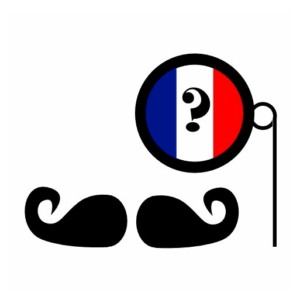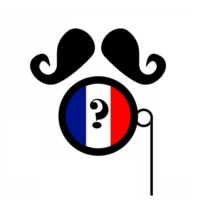 In today’s entry of our Ask a Frenchman series, we’re delving a little bit into one of the oddities of the French language: its diacritics, and especially, the circumflex accent.
In today’s entry of our Ask a Frenchman series, we’re delving a little bit into one of the oddities of the French language: its diacritics, and especially, the circumflex accent.
If you’re not too familiar with the language the circumflex accent is the little “roof” (my first-grade teacher, Ms. Rieumajou, called it “a little hat”) that can sometimes be found above some vowels. Like this: â, ê, î, ô, û.
It all started with a question that Shea asked me quite a while ago:
“Why is there a circumflex accent on dîner? I know that in most cases it replaces a missing ‘s’ but what’s the story with this word?”
And here is my answer, along with a few more pieces of information about this funny-looking accent, as I’m totally using this question as an excuse to tell you a bit about that part of the history of the French language. I’d use anything as an excuse to tell you about the history of the French language.
First of all, Shea is right. The circumflex accent replaces a missing ‘s’ that used to be present in old French and that is usually still there in English; for example, forêt and forest, hôpital and hospital, etc.
So, what’s the deal with dîner? One does not say “to disne” or “disnner” in English!
Well, the thing is that the circumflex accent still replaces a missing ‘s’ in dîner, but that is one from a very long time ago.
See, all of these words that have lost their ‘s’ in French but not in English have lost them quite recently, most of them in the late Middle Ages, long after William the First imported the French language to England (and the ‘s’ in those words with it) in 1066.
A quick reminder if you’re bad at history and at linguistics. While the English language is considered a Germanic language (because of its origins, its syntax, etc.) the majority of its vocabulary actually comes from French. The reason is that the Normans who conquered England in the 11th Century were French speakers. Their descendants became the dominant class of England (aka the aristocracy) and they remained French speakers for a few centuries. Long enough to have a drastic influence on the English language.
Also, you may be surprised that two paragraphs above, I said “quite recently” meaning a few hundred years ago. Yes, “a few hundred years” when dealing with the evolution of languages is usually “quite recently.” (not always, but usually)
Dîner comes from the Latin verb disjejunare (to stop fasting). The prefix dis- meaning “stop” is not uncommon in English. We find it in many words; in most of the words starting with “dis-” actually.
You’ll also notice that the verb déjeuner in French (to have lunch) comes from the very same Latin verb and is almost a literal translation of “to stop fasting.” The prefix “dé-” is equivalent to the English “dis-” and jeuner means to fast.
So, in the case of disjenunare eventually becoming dîner in French and to dine / dinner in English, the ‘s’ disappeared quite early in the language. I’m not sure when, but most certainly before the Norman Invasion, as we have a circumflex accent in French, but not ‘s’ in English.
However, I assume that the circumflex accent appeared in dîner much later than the disappearance of the “s”, but it’s just an assumption.
And this is my excuse to tell you about the history of the circumflex accent, because, you see, accents in French are not just there for cosmetic purposes. They do have a use beyond just making a word look French when you put a random accent on it. English marketers may not be aware of that, though.
To understand this history, we need to go back in time to the Middle Ages. I know it’s a period that’s blurry at best for most “New Worlders” but bear with me, I can’t tell you all about medieval times right now (Google may help, books too, just keep in mind that dragons didn’t actually exist then and they never did).
During the Middle Ages, Guttenberg hadn’t been born yet and China was more or less unknown, so in order to duplicate a document medieval people used monks!
Yes, there were monks everywhere at the time, and as they couldn’t spend their days just praying, it was necessary to find them some sort of occupation. They were among the very few literate people back then, so they were asked to copy books. By hand! Not all monks did, some also brewed beer, but the copying monks copied books. That’s what they did.
As a side note, I will never allow anyone to say that monks are useless. Monks brought us two of the finest things in the world: books and Trappist beer.
There were two types of copying monks. The docile ones and the rebellious ones.
The docile monks were the ones that just were going on about their business, copying books without making any waves. Dutifully copying what they had in front of them without a second thought. They usually did a good but dull job and as a consequence, none of them has left their name down in history.
The rebellious ones didn’t leave their names down in history either, but they definitely left their mark, especially in the French language (not only the French language, but this is our topic of interest right now).
Why is that?
Let me give you an example.
Let’s take the word hospital. Back in the day, as previously mentioned, it was spelled and pronounced the same way in French and in English. However, things changed in France and little by little the ‘s’ stopped being pronounced in French.
The docile monks, doing their job the way they had been taught, kept on writing hospital fully knowing that it was not pronounced this way anymore, but who were they to dare think by themselves?
Keep in mind that we are centuries before Du Bellay and his friends went on an ego trip that totally messed up French spelling and even more centuries before Richelieu invented the Académie Française that screwed up the French language even more. Among other silly things, it is the Académie who managed to freeze spelling, making spoken French and written French two (almost) separate languages. Oh, you thought Richelieu only was the bad guy in the Three Musketeers? Well, he also was the bad guy in your attempts at learning French.
Before these two men left their unnecessary marks on the French language, believe it or not, it actually was written the way it sounded for the most part.
Still, shy and docile monks, probably afraid to be yelled at by the head monk in their monastery, didn’t dare to drop that ‘s’ from hospital.
But one day, one of the courageous and/or rebellious monks said something along these lines (except that it was in old French):
“To hell with it! We haven’t pronounced that ‘s‘ in ages, why are we still writing it? I’ve had enough, I’m getting rid of it!”
And he did just that.
From that moment in time, hospital was going to be written hopital, and the rest was going to be history!
Except that it didn’t exactly happen like this.
Did the rebellious monk have some remorse for such drastic action? Did he get caught by the head monk and did he get into trouble?
We don’t know, but there is something that made him think that this ‘s’ had to be honored and remembered somehow. It would be unfair to just make it disappear in the limbo of forgotten and abandoned letters. So, our monk decided to add a mark, a circumflex accent, on the previous letter – a bit like a memorial to that departed ‘s’.
And then, somehow, the thing started spreading. Maybe because the head monk was a bit of a progressive himself and told everyone else in the monastery to do the same? Maybe because the other monks were all dull monks and they just copied the new spelling without thinking twice about it. Was there a big meeting of copying monks who decided to agree on the thing? We’ll never know, it’s unlikely that anyone copied the minutes of that meeting.
What we know is that little by little, all words with a silent non-final ‘s’ eventually saw that ‘s’ disappear in spelling and they gained a circumflex accent on the previous vowel in return.
And now you know why the French accent has this funny-looking accent in addition to the other ones.
You’re welcome.

If you found this post interesting, why don’t you buy me a coffee?
or become a patron?
Discover more from liminal web
Subscribe to get the latest posts sent to your email.


